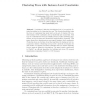Free Online Productivity Tools
i2Speak
i2Symbol
i2OCR
iTex2Img
iWeb2Print
iWeb2Shot
i2Type
iPdf2Split
iPdf2Merge
i2Bopomofo
i2Arabic
i2Style
i2Image
i2PDF
iLatex2Rtf
Sci2ools
145
click to vote
ECML
2007
Springer
2007
Springer
Clustering Trees with Instance Level Constraints
Abstract. Constrained clustering investigates how to incorporate domain knowledge in the clustering process. The domain knowledge takes the form of constraints that must hold on the set of clusters. We consider instance level constraints, such as must-link and cannot-link. This type of constraints has been successfully used in popular clustering algorithms, such as k-means and hierarchical agglomerative clustering. This paper shows how clustering trees can support instance level constraints. Clustering trees are decision trees that partition the instances into homogeneous clusters. Clustering trees provide a symbolic description for each cluster. To handle non-trivial constraint sets, we extend clustering trees to support disjunctive descriptions. The paper’s main contribution is ClusILC, an efficient algorithm for building such trees. We present experiments comparing ClusILC to COP-k-means.
Clustering Process | Constrained Clustering | ECML 2007 | Instance Level Constraints | Machine Learning |
| Added | 07 Jun 2010 |
| Updated | 07 Jun 2010 |
| Type | Conference |
| Year | 2007 |
| Where | ECML |
| Authors | Jan Struyf, Saso Dzeroski |
Comments (0)

